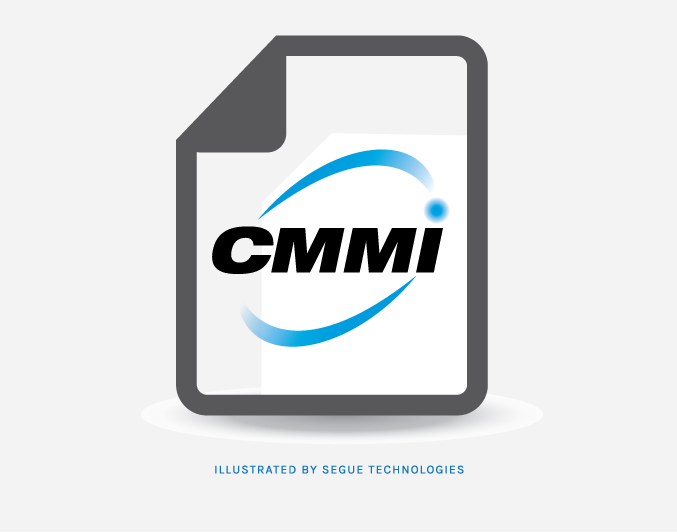Software Development can cover a broad range of projects with a wide range of complexity and costs. From a quick project that can be completed in a week with a single knowledgeable developer, like a simple website, to multi-year enterprise development projects with large teams broken into requirements, development, testing, and other key areas. A lot of companies provide Software Development as one of their service areas, but even looking at their experience and self-described capabilities, how can a customer tell if their development contractor has a proven and repeatable approach? This blog will describe what it means for a Software Development company to be appraised as CMMI-DEV v1.3 (Staged): Maturity Level 3 and the benefits of conducting business with a company that has been appraised at CMMI level 3
What Is CMMI?
CMMI stands for “Capability Maturity Model Integration” and is a model that provides appraisal and training for process improvement in organizations. CMMI was created by the Software Engineering Institute (SEI) as a result of research into organizations that would consistently deliver quality software on time and within budget. SEI wanted to know what it was that distinguished these high performing organizations from the majority who produced inconsistent or failed results. The CMM developed as a documentation of the attributes shared by the successful organizations. Additionally, it organizes these attributes into Practice Areas, each with goals and specific practices that form a roadmap to how to become one of these high performing organizations. CMMI can improve capability in people, processes in a single project, department, or entire organization.
What is CMMI-DEV?
The CMMI version 1.3 contains three “constellations” or models: services (CMMI-SVC), acquisition (CMMI-ACQ), and development (CMMI-DEV). The CMMI-SVC model provides guidance for organizations that provide services within their organization and to external customers. The CMMI-ACQ model provides guidance to organizations to enable their leadership to make informed and decisive acquisitions. The CMMI-DEV model is used for process improvement in organizations that develop products. CMMI for Development contains practices that cover project management, process management, systems engineering, hardware engineering, software engineering, and other supporting processes used in development and maintenance (CMMI Institute).
CMMI-DEV provides guidance for process improvement across a project, department, or organization that will lead to lower costs, improved quality, and on time delivery of products and services. CMMI-DEV guidance covers the life cycles of products from conception through delivery and maintenance. CMMI-DEV best practices are flexible enough to apply to a variety of industries, yet stable and consistent enough to provide a benchmark against which your organization can measure and compare itself. Therefore, when a company is appraised at CMMI for Development, it means that the company has been trained, assessed, and appraised in the areas of product and service development.
Within CMMI-DEV there are five maturity levels, of which an organization can be appraised at level 2 through 5. Below is a graphic representation of what each of the levels mean:

In order to be appraised at a level, an organization must meet all the Process Areas within that level and all the Process Areas in the levels below:
Maturity Level 2 (ML 2) in CMMI-DEV includes the following Process Areas:
- Configuration Management (CM)
- Measurement and Analysis (MA)
- Project Monitoring and Control (PMC)
- Project Planning (PP)
- Process and Product Quality Assurance (PPQA)
- Requirements Management (REQM)
- Supplier Agreement Management (SAM)
Maturity Level 3 (ML 3) in CMMI-DEV includes the following Process Areas:
- Decision Analysis and Resolution (DAR)
- Integrated Project Management (IPM)
- Organizational Process Definition (OPD)
- Organizational Process Focus (OPF)
- Organizational Training (OT)
- Product Integration (RD)
- Requirements Development (RD)
- Risk Management (RSKM)
- Technical Solution (TS)
- Validation (VAL)
- Verification (VER)
When Segue Technologies was appraised CMMI-DEV v1.3 (Staged): Maturity Level 3, it means that we have a detailed process that guides the product lifecycle from its conception throughout to its delivery and maintenance, which is shown by our adherence to the Process Areas in both ML 2 and ML 3. It means that, as a company, Segue uses the CMMI best practices for its product and service development.
Why Should You Do Business with a Company that is Appraised for CMMI?
Doing business with a company that is appraised for CMMI for development has many advantages. First, since CMMI for development leads to better quality products, doing business with such a company means that the products provided will be of high quality. Another benefit of doing business with such a company is that they can provide more accurate schedules and realistic timelines, leading to more realistic deadlines for product releases. The CMMI-DEV will therefore provide the best practices throughout the product lifecycle to ensure timely delivery and quality products.
